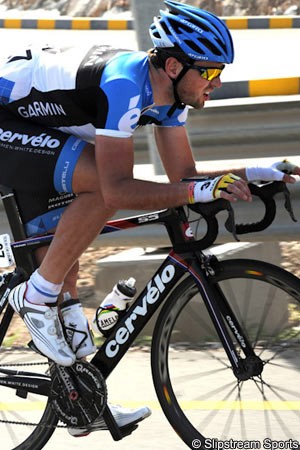Governing body accepts that it failed to follow WADA protocols but wants rider suspended regardless
 The International Cycling Union (UCI) confirmed last December that it was to appeal the decision of the Danish Sports Federation to clear Alex Rasmussen over his three whereabouts violations to the Court for Arbitration in Sport (CAS). According to tv2sport.dk, the sport’s governing body wants to ban the rider, who is now with Garmin-Barracuda, for the maximum two-year period. This, despite acknowledging that it failed to correctly follow World Anti-Doping Agency (WADA) procedures, which was the primary reason for Rasmussen’s acquittal.
The International Cycling Union (UCI) confirmed last December that it was to appeal the decision of the Danish Sports Federation to clear Alex Rasmussen over his three whereabouts violations to the Court for Arbitration in Sport (CAS). According to tv2sport.dk, the sport’s governing body wants to ban the rider, who is now with Garmin-Barracuda, for the maximum two-year period. This, despite acknowledging that it failed to correctly follow World Anti-Doping Agency (WADA) procedures, which was the primary reason for Rasmussen’s acquittal.
“The UCI writes in his assertion document that Alex should be condemned to exclusion of two years, which would be an unusually severe punishment,” Rasumssen’s lawyer Asser Gregersen told tv2sport.dk. “It is the maximum penalty; the maximum penalty is one to two years.”
When the news broke of Rasmussen’s third violation to the whereabouts rules – which require all riders to register their location for a certain time of day, several weeks in advance, so that they can be found by anti-doping officials for out of competition tests – he was immediately fired by the HTC-Highroad team, which had a strict anti-doping policy. [although the reason for his being fired was that he had failed to mention his previous two violations when he joined the team – ed]
His agreed move to Garmin-Barracuda, which has a similar anti-doping stance, looked to be in jeopardy, but he officially joined the American team once he was cleared by Danish authorities.
The main reason for that clearing was that the UCI had not stuck to the timetable imposed by WADA in dealing with the Danish rider.
“WADA’s rules say that when you are not where we should have been, then you need to be told within 14 days, so you have the opportunity to explain yourself,” explained Gregersen. “The UCI has not done this in Alex’s case, they waited 10 weeks to contact Alex.
“The UCI recognises that they have not complied with the WADA rule, but the UCI will then use two-thirds of their appeal to argue why it should not have any bearing on the case against Alex,” he added. “The UCI has violated WADA rule; it’s not a particularly aggressive appeal from UCI’s side.”
Gregersen sees a direct parallel between the UCI’s lateness and Rasmussen’s in this case.
“The UCI can see that they have been for a long time about it, but they do not think it should have no bearing on the decision in Alex Rasmussen affair,” he said. “Conversely, they believe that it must have meaning for Alex that he did not comply with formalities.”
While Rasmussen has never sought to deny that he committed the three violations of whereabouts regulations, his camp feels that the UCI request to ban him for the maximum period allowable is excessive in the extreme.
“Firstly, Alex was not cheating here,” said Gregersen. “If it was proved had cheated, he would obviously have a tougher punishment.
“Alex is not a doping cheat, he just forgot to update some records, this is even agreed by the UCI. In one case Alex actually tried to update his whereabouts, but it went wrong for technical reasons.
“Should this really be punished with a two year suspension?”
Since the two-year penalty is the maximum allowable period, Gregersen also argues that the fact that Rasmussen has co-operated fully surely means that they should not be looking to apply the full sanction.
“Secondly, Alex immediately admitted his mistakes when he discovered them,” he said. “When athletes admit right away, then it is possible that the athlete should be given a discounted penalty, and Alex is an obvious example of this situation.
“But the UCI is not willing to give any discount, though they acknowledge that Alex admitted is,” he continued. “If Alex should be punished, it must be taken into account that the man has confessed and helped with the investigation.”
Gregersen’s final argument again pulls up the UCI’s delay in the case, as well as the time that the process is taking; drawing parallel’s with another recently concluded case at the CAS.
“Thirdly, the case is unreasonably prolonged, something that will probably take a year to resolve,” he said. “As in Contador’s case, Alex’s case has been delayed for reasons that have nothing to do with him. If the UCI had cared about his job, the this the case would have been settled before last summer and maybe even gone through CAS if it had gone wrong.
“And then Alex might ridden in the World Championships in Copenhagen in September last year,” he concluded.
Rasmussen did not race for HTC-Highroad after he was pulled from Tour of Britain team in mid-race, as the news of his violations was announced; he is currently riding in the Tour of Oman for his new team. CAS has yet to set a date for the UCI’s appeal, so it remains to be seen how long it will take for the case to be finally settled.